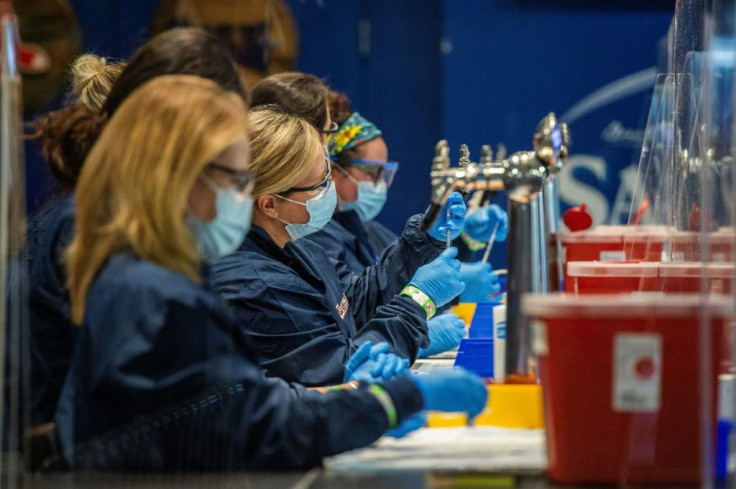Two Vaccines in the Home Stretch; Others on Way Out

The Pfizer and Moderna vaccines have been on the market for almost two months, with millions of doses in circulation but months or years ahead before herd immunity can be reached. New additions from Johnson & Johnson and Novavax could significantly expand the supply. The Johnson & Johnson vaccine offers a notable alternative to the Pfizer and Moderna vaccines, because it is a single shot, as opposed to their two-shot requirement.
Johnson & Johnson
Johnson & Johnson announced the results of its Phase 3 trials on January 29th. The primary goals of the study were to see how effective the vaccine was in preventing moderate to severe disease, 14 days and 28 days after vaccination. Patients with moderate disease have signs of pneumonia, can’t breathe properly or deep vein thrombosis or other issues. The severe cases are in respiratory failure, experiencing organ failure, in shock and more. The trials spanned three regions of the world, eight countries and more than 43,000 people.
At 28 days, the vaccine worked in preventing 85% of severe disease in all trial regions.
The results were different by geography. In the US, the level of protection was 72%; in Latin America, it was 66% and 57% in South Africa. In South Africa, 95% of patients had the more infectious strain of the coronavirus. 41% of the participants had significant comorbidities including 28% were obese and 10% had hypertension.
Johnson & Johnson’s vaccine requires a single shot and is based on viral vector technology. With this method, researchers use another virus, either one that does not affect humans or that has been modified to do the same, to carry instructions to cells in the immune system. This messenger tells the cells to make an antigen, which in turn triggers manufacture of antibodies that will fight off infection.
The company has announced it will seek emergency use authorization from the FDA very soon.
Novavax
Novavax recently released results of its Phase 3 UK vaccine trial, showing an overall 89.3% efficacy rate. This trial tested both the UK and South African variants of the virus.
50% of the cases from the Novavax trial were attributed to a newer strain of the coronavirus, first discovered in the UK. This study enrolled 15,000 participants.
90% of cases in the biotech’s phase 2B trial for South Africa were from the new variant found in South Africa. According to the release, “Efficacy by strain was calculated to be 95.6% against the original COVID-19 strain and 85.6% against the UK variant strain.” This study enrolled more than 4,000 participants.
Results, however, against the South Africa strain did not reach the same efficacy figures: with this strain, efficacy was 60%, for mild, moderate and severe Covid-19 patients, who were HIV-negative. The efficacy was reduced when HIV-positive patients were included: 49%.
The Novavax vaccine is protein-based. Its technology involves the use of nanoparticles and an additive, designed by Novavax, to boost the immune system’s response to a purified spike protein. The spike protein is the molecule that allows entry into the cell so the virus can replicate. The protein, encoded with the SARS-CoV-2 spike genetic sequence, is made in insect cells.
Novavax is working on a vaccine to address the new strains.
The rest of the field
With global vaccine distribution hampered by ongoing supply issues, Novartis has joined forces forces with BioNTech to bolster vaccine production. Novartis will produce the vaccine’s active ingredient at its site in Stein, Switzerland, starting in the second quarter of 2021.
Merck, which had been part of the Trump administration’s Operation Warp Speed initiative, has ceased development on its vaccine candidates. Citing disappointing efficacy results compared to its competitors, the company has decided to focus its efforts on developing therapeutic treatments for patients that have contracted the virus.
The take home
Diversifying the vaccine supply could be a key part of the fight against Covid-19. More vaccines mean more supply, and single-dose offerings could help more people get vaccinated. Different approaches are also showing different results in countering emerging strains of the virus.
Mathai Mammen, MD, PhD. Global Head of Research & Development at Johnson & Johnson’s Janssen Pharmaceuticals, suggested its vaccine will change the course of the pandemic because it is a single-shot vaccine that does not require special storage specifications, as does the Pfizer vaccine. It has the potential, he said, to ramp up the number of vaccines distributed and used.
"Changing the trajectory of the pandemic will require mass vaccination to create herd immunity,” he said, adding, “The ability to avoid hospitalizations and deaths would change the game in combating the pandemic."
Sean Marsala is a health writer based in Philadelphia, Pa. Passionate about technology, he can usually be found reading, browsing the internet and exploring virtual worlds.
Published by Medicaldaily.com



























